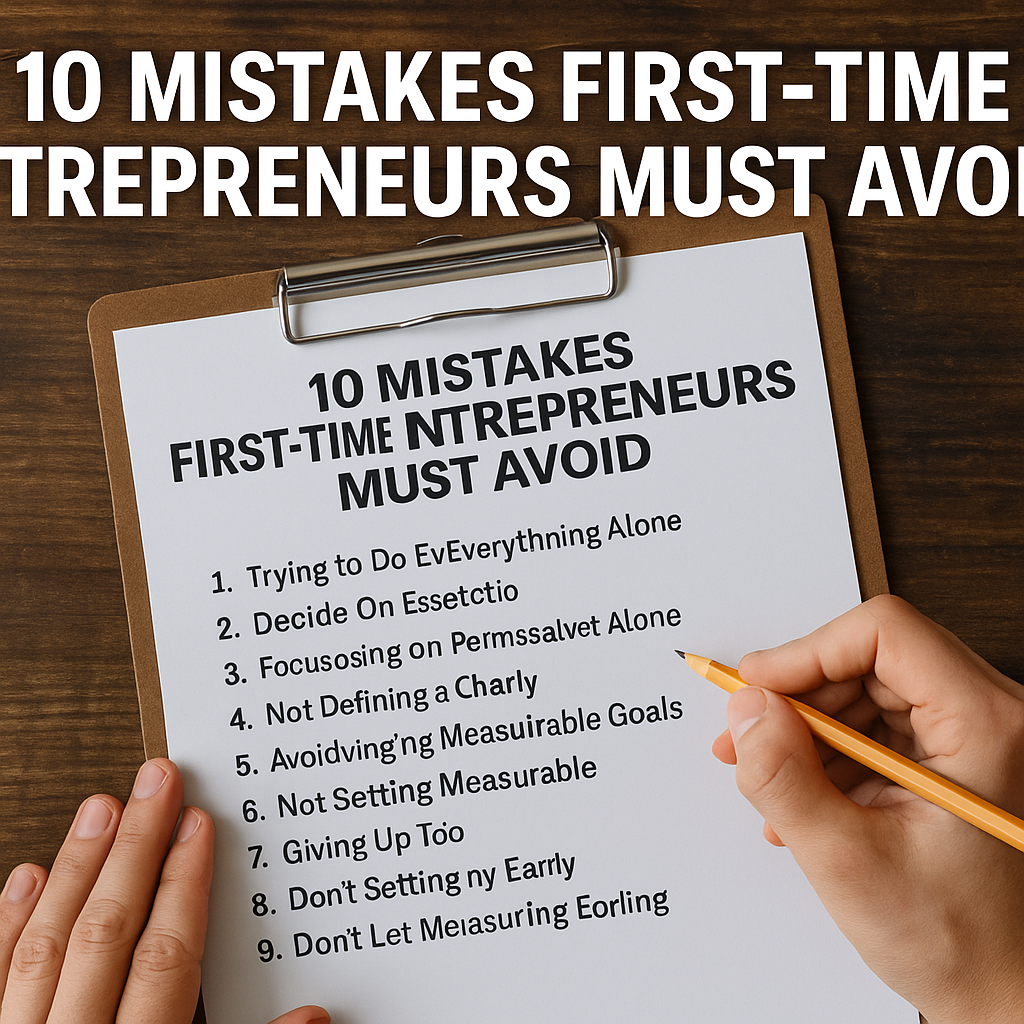Starting a business is exciting, but it’s also filled with challenges that can derail your progress before you even gain momentum. First-time entrepreneurs, especially, are vulnerable to making common mistakes that can be costly—both financially and emotionally. Understanding these pitfalls can save you time, money, and frustration as you build your business.
Here are the top 10 mistakes you should avoid as a new entrepreneur—and what to do instead.
1. Not Doing Enough Market Research
Many entrepreneurs fall in love with their idea but forget to test whether people actually want or need it.
- Why it’s a mistake: Without market validation, you might build something no one will buy.
- What to do instead: Use surveys, social media polls, and simple interviews to understand your audience. Research competitors to identify gaps and opportunities.
2. Trying to Do Everything Alone
It’s tempting to take on every task when starting out, but this often leads to burnout.
- Why it’s a mistake: You’ll spread yourself too thin and make costly errors in areas you’re not skilled in.
- What to do instead: Delegate or outsource tasks where possible. Even small budgets can afford help through platforms like Fiverr or Upwork. Surround yourself with a network for support and collaboration.
3. Not Defining a Clear Business Model
Without a business model, it’s hard to understand how you’ll actually make money.
- Why it’s a mistake: You’ll waste time and resources without a roadmap for revenue.
- What to do instead: Choose a model (e.g., subscription, service-based, ecommerce, etc.) and map out how customers will find you and pay for what you offer.
4. Focusing on Perfection Over Progress
Many entrepreneurs delay launching because they want everything to be perfect.
- Why it’s a mistake: You lose time and momentum waiting for a “perfect” product or website.
- What to do instead: Launch with a Minimum Viable Product (MVP). Improve based on feedback. Action builds clarity faster than endless planning.
5. Ignoring Cash Flow and Budgeting
A lack of financial planning is one of the leading causes of business failure.
- Why it’s a mistake: Running out of money—even with great ideas—can shut you down.
- What to do instead: Track every expense, even if it’s small. Create a simple budget and update it weekly. Use free tools like Wave or Google Sheets to manage cash flow.
6. Underpricing Your Products or Services
New entrepreneurs often undervalue themselves in order to attract customers.
- Why it’s a mistake: Low prices can make you look cheap and unsustainable.
- What to do instead: Price based on value, not just cost. Know your worth and research what others are charging. Test different pricing strategies if needed.
7. Not Having a Clear Target Audience
Trying to serve everyone ends up serving no one.
- Why it’s a mistake: Vague messaging won’t attract loyal customers.
- What to do instead: Define your ideal customer. Be specific—age, profession, lifestyle, problems. Craft your marketing around them.
8. Avoiding Marketing and Promotion
“If you build it, they will come” doesn’t apply to business.
- Why it’s a mistake: Without visibility, no one knows you exist—even if your product is amazing.
- What to do instead: Learn the basics of digital marketing. Start promoting on social media, create valuable content, and grow an email list from day one.
9. Not Setting Measurable Goals
Wandering without direction can kill your motivation.
- Why it’s a mistake: Without goals, you can’t measure success or improve.
- What to do instead: Set SMART goals (Specific, Measurable, Achievable, Relevant, Time-bound). Track your progress monthly and adjust accordingly.
10. Giving Up Too Early
The first few months (or years) of business are tough—and many give up before results show.
- Why it’s a mistake: Success often requires more time than you expect.
- What to do instead: Stay consistent, even when growth is slow. Celebrate small wins and focus on long-term progress. Every setback is a lesson.
Don’t Let These Mistakes Define Your Journey
Making mistakes is part of the entrepreneurial process—but learning from them is what sets successful founders apart. By being aware of these common pitfalls and taking proactive steps, you set yourself up for a much smoother path.
Remember: entrepreneurship is a marathon, not a sprint. With resilience, strategy, and the right mindset, you’ll navigate the road ahead far better than most.

